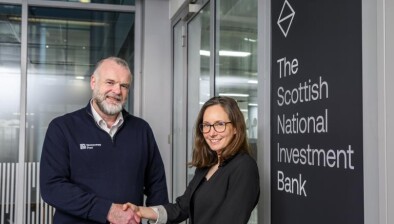Report sets out Scottish National Investment Bank’s role in achieving affordable clean heat

Willie Watt
The Scottish National Investment Bank (SNIB) has a key strategic part to play in helping to deliver Scotland’s low carbon heating systems.
A new insight paper called ‘Scotland’s transition to net zero heat’ released today sets out the bank’s role in tackling the issue and builds on the commitments in the Scottish Government’s Heat in Buildings Strategy.
Decarbonising heat and buildings remains one of the most important and challenging issues in the transition towards a green economy.
With over 80% of Scotland’s homes relying on mains gas, heating and cooling the nation’s buildings contribute to more than a fifth of total greenhouse gas emissions.
Willie Watt, chairman of the Scottish National Investment Bank said: “The report shows the Bank has specific roles to play to help people and businesses access cleaner, greener, more affordable heat and energy.
“We have clear actions to take forward and look forward to developing our plans and exploring the ways in which the public and private sectors can work together to accelerate towards achieving Scotland’s climate goals.”
As Scotland works towards achieving ambitious climate change commitments, including to reduce greenhouse gas emissions from homes and buildings by more than two thirds by 2030, there will be many opportunities for investment in decarbonising heat projects.
There will also be a need for the public and private sectors to work together to develop business cases, and to de-risk projects that are commercially viable. At the heart of the new report are the six areas in which the Bank has identified a role for itself.
These areas cover Scotland specific issues such as tackling low energy efficiency in the nation’s buildings, as well as finding ways to finance the installation of low-carbon heat sources.
Supporting the development of new technologies and the new businesses needed to retrofit these properties is one area where the Bank could have a role.
The bank is already investing in net-zero heat in Scotland and is looking to collaborate across the private and public sectors to support government and industry.
Beyond investments, the bank can work with social and other landlords to develop solutions to net zero heat, as well as partner with financial institutions to help individuals spread the cost of making improvements in their homes over the longer term.
The recent soaring prices of gas, coal and electricity have impacted households and businesses, demonstrating the importance of reducing reliance on fossil fuels and investing in low carbon heating solutions.
The bank believes that Scotland has the chance to address long-standing issues of poor energy efficiency and high levels of fuel poverty through the transition to low-carbon heat, and support should be means-tested to ensure that both financial and practical help is given to those who need it most.
Willie Watt added: “Wherever it can, the Scottish National Investment Bank will work with policy makers, businesses, the finance sector, researchers, and others working on net-zero heat to develop the understanding of how our collective impact can be maximised.”

















